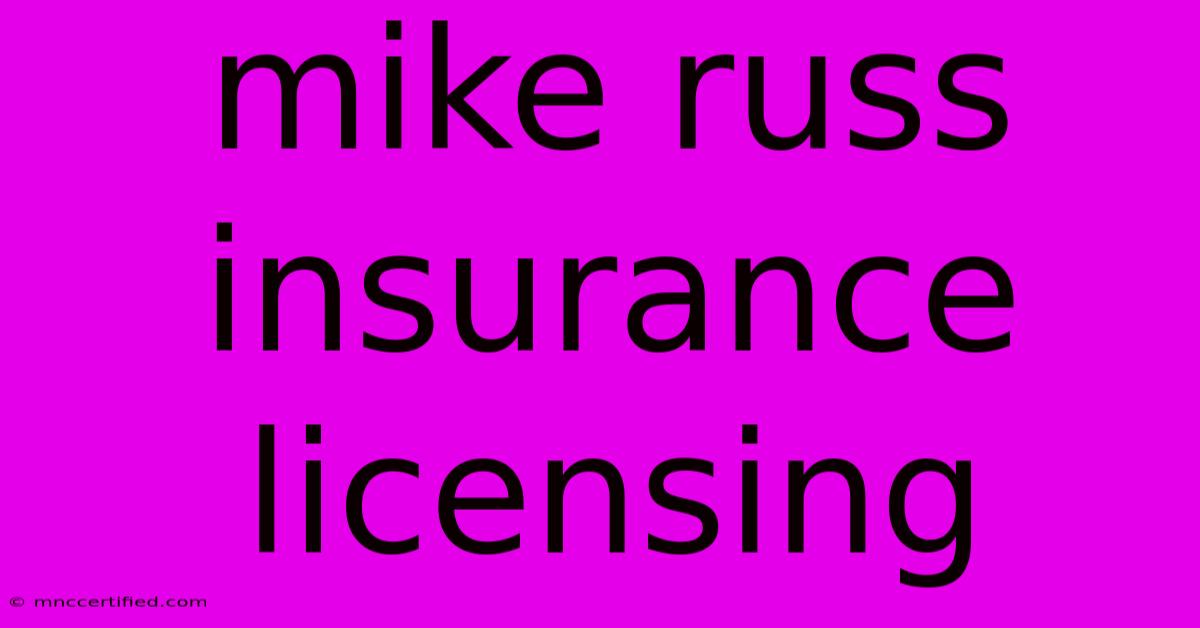Mike Russ Insurance Licensing

Table of Contents
Navigating the World of Mike Russ Insurance Licensing: A Comprehensive Guide
Obtaining the necessary insurance licenses is crucial for anyone looking to work in the insurance industry, and understanding the specific requirements can be daunting. This comprehensive guide focuses on the licensing process potentially associated with an individual named "Mike Russ," highlighting the general steps involved in obtaining insurance licenses and offering advice for success. We will not be providing specific information about any individual's licensing status, as that would violate privacy regulations. This article serves as a general resource for anyone researching insurance licensing.
Understanding the Insurance Licensing Process
The insurance licensing process varies significantly depending on the state and the specific type of insurance being sold (life, health, property, casualty, etc.). However, some common elements include:
1. Meeting Eligibility Requirements:
- Age: Most states require applicants to be at least 18 years old.
- Education: While a specific degree isn't always mandatory, some states may require a high school diploma or equivalent.
- Background Check: A thorough background check, including criminal history and credit report review, is standard practice. This is to ensure the integrity and trustworthiness of individuals working in the insurance field.
- Pre-licensing Education: Before taking the licensing exam, you must complete a pre-licensing education course approved by your state's Department of Insurance. The required coursework varies by state and license type. This education covers essential insurance principles, regulations, and ethical considerations.
2. Passing the State Licensing Exam:
- Exam Content: The licensing exam tests your knowledge of insurance regulations, products, sales practices, and ethical conduct. The specific content will depend on the type of insurance license you're seeking.
- Exam Preparation: Thorough preparation is key to passing the exam. Utilize study guides, practice exams, and review courses specifically designed for your state's exam. Don't underestimate the importance of effective study strategies.
- Exam Scheduling: Once you complete your pre-licensing education, you can schedule your exam through your state's Department of Insurance or a designated testing center.
3. Completing the Application Process:
- Application Forms: You'll need to complete a detailed application form, providing accurate information about your background, education, and experience. Accuracy is paramount; any discrepancies can lead to delays or rejection.
- Fees: Expect to pay application and licensing fees. These fees vary by state and license type.
- Fingerprinting: Most states require fingerprinting as part of the background check process.
- Continuing Education: Many states mandate ongoing continuing education credits for license renewal to ensure licensees stay updated on industry changes and best practices.
Tips for Success in Obtaining Your Insurance License
- Research Your State's Requirements: Each state has its own unique licensing requirements. Thoroughly research your state's Department of Insurance website for specific rules and regulations.
- Choose a Reputable Pre-Licensing Education Provider: Selecting a reputable provider ensures you receive high-quality instruction and are well-prepared for the licensing exam.
- Start Early: Give yourself ample time to complete the pre-licensing education and prepare for the exam. Rushing the process can lead to mistakes and failure.
- Network with Industry Professionals: Connect with experienced insurance professionals who can provide valuable insights and guidance.
Beyond the License: Maintaining Ethical and Professional Standards
Obtaining a license is just the first step. Maintaining ethical and professional conduct is crucial for a successful career in the insurance industry. This includes:
- Adhering to all state and federal regulations.
- Prioritizing client needs and providing excellent service.
- Maintaining ongoing professional development.
- Upholding the highest ethical standards in all business dealings.
This guide provides a general overview of the insurance licensing process. Remember to consult your state's Department of Insurance for the most up-to-date and accurate information related to specific licensing requirements. Always prioritize accuracy and ethical conduct throughout the entire process. Success in the insurance industry hinges on both obtaining the necessary credentials and consistently maintaining a high level of professional integrity.

Thank you for visiting our website wich cover about Mike Russ Insurance Licensing. We hope the information provided has been useful to you. Feel free to contact us if you have any questions or need further assistance. See you next time and dont miss to bookmark.
Featured Posts
-
Live Tottenham Vs Roma Tv And Team News
Nov 29, 2024
-
Thanksgiving Turkey Trot Race
Nov 29, 2024
-
Med Spa Malpractice Insurance
Nov 29, 2024
-
Primo Choice Insurance Agency
Nov 29, 2024
-
Cyber Insurance Tail Coverage
Nov 29, 2024